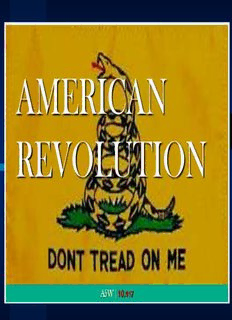
AMERICAN REVOLUTION - AHS AP U.S. HISTORY / FrontPage PDF
Preview AMERICAN REVOLUTION - AHS AP U.S. HISTORY / FrontPage
AMERICAN REVOLUTION A5W |10.917 The Philosophy of the American Revolution Why did the Colonists revolt? (examples?) Preserve self-rule: “Taxation without (actual) representation” Protect Fundamental rights & liberties (J. Locke) Protect economic interests British corruption, aristocracy (“City on a hill”) Was the Revolution inevitable? Could Britain have avoided it? Who was right? Focus Question Why did the American colonies decide to seek independence from Britain? DECISION FOR INDEPENDENCE DECISION FOR INDEPENDENCE Second Continental Congress (May 1775-May 1781) purpose public opinion Continental Army G. Washington Olive Branch Petition British Response – Prohibitory Act George Washington assumes Olive Branch Petition Role in revolution command of Continental Army, July 1775 Patriot and Loyalist Strongholds DECISION FOR INDEPENDENCE: Jan. 1776 Common Sense Hessian soldiers Thomas Paine George Washington's copy of Common Sense (Boston Athenaeum) DECISION FOR INDEPENDENCE Decision for independence – Reasons Declaration of Independence Foundational beliefs DECISION FOR INDEPENDENCE Significance of Declaration of Independence Directed to other nations: paved way for eventual French aid Provided a clear position for rebellious colonists & forced uncommitted people to either choose rebellion or declare as Loyalists. treason – Franklin “We must all hang together or assuredly we shall all hang separately” Radical for its time - equality; inherent rights; gov’t served people – Yet merely claiming to protect existing rights and freedoms Inspired later liberation movements – French Revolution (Declaration of the Rights of Man) – later basis for anti-slavery and other liberation movements (“All ... created equal”) – Anti-colonial inspiration – eg Vietnam, Ho Chi Minh WAR FOR INDEPENDENCE
Description: